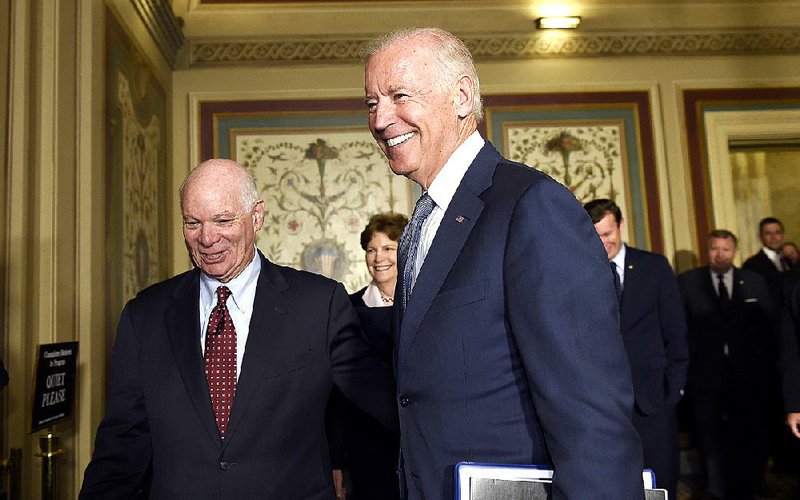WASHINGTON -- At home and abroad, the White House courted support for a landmark nuclear deal with Iran on Thursday as congressional leaders in both parties pointed toward a politically charged showdown this fall over Republican attempts to scuttle the agreement.
"It blows my mind that the administration would agree to lift the arms and missile bans and sanctions," said House Speaker John Boehner, R-Ohio, referring to some of the provisions in the complex accord.
He said the Republican-controlled Congress would likely soon be on track to pass legislation denying President Barack Obama the ability to lift numerous financial and other restrictions Iran currently faces.
House Democratic leader Nancy Pelosi of California became the first prominent Democrat in Congress to back the deal, saying she is "very optimistic about our ability to support the president."
Obama has pledged to veto any bill rejecting the agreement. Neither Pelosi nor Boehner ventured a prediction on the final outcome.
The maneuvering in Congress unfolded as Secretary of State John Kerry met with Saudi Foreign Minister Adel Al-Jubeir, coming away without an immediate endorsement for the deal.
"We hope that the Iranians will use this deal in order to improve the economic situation in Iran and to improve the lot of the Iranian people and not use it for adventures in the region," the Saudi diplomat said. His country is Iran's main rival in the Middle East, and Kerry promised to respond if Tehran supports terrorism against its neighbors.
Al-Jubeir was to meet with Obama today in Washington to discuss the concerns Saudi Arabia has about the nuclear agreement, according to a White House official who asked for anonymity to discuss a meeting that hasn't been publicly announced.
Kerry intends to brief Persian Gulf leaders early next month at a meeting in Qatar. Defense Secretary Ashton Carter will leave this weekend for the Middle East, with stops in Israel and Saudi Arabia. Officials said his mandate is to reassure the Jewish state that the U.S. is committed to guaranteeing its ally's regional military superiority.
Under the agreement, Iran pledged to curb its nuclear program for a decade in exchange for potentially hundreds of billions of dollars' worth of relief from international sanctions. Many penalties on the Iranian economy, such as those related to the energy and financial sectors, could be lifted by the end of the year.
At a news conference in the Capitol complex, Boehner spoke strongly against the agreement and rebutted one of Obama's central claims over the past two days.
"If President Obama says it's this deal or war, well that's a false choice. The sanctions were working and bringing Iran to its knees," Boehner said. The House, he added, is "going to fight a bad deal that's wrong for our national security and wrong for our country."
Under a bill Obama signed in anticipation of the accord, he has five days to submit the agreement with Iran to Congress. Lawmakers then have 60 days to receive briefings, hold hearings and pass any legislation disapproving it.
Lawmakers do not have the authority to defeat the deal, but they can block the president from lifting sanctions that Congress has voted to put in place.
In announcing the deal Tuesday, Obama said he would veto any attempt to change the terms. It would take a two-thirds vote in each house to override the veto.
Several Republicans complained that the United Nations is scheduled to vote before Congress on lifting some sanctions against Iran.
Wendy Sherman, the lead U.S. nuclear negotiator, said Thursday that even a U.N. vote in favor would not mean sanctions on Iran would come off in that time frame.
The U.N. Security Council also is set to vote on a resolution endorsing the deal. That vote is scheduled for Monday morning.
Meanwhile, Israeli Prime Minister Benjamin Netanyahu has been a fierce opponent of the deal, saying it would put Iran on a path toward acquiring a nuclear weapon.
In an appearance with British Foreign Secretary Philip Hammond on Thursday in Jerusalem, Netanyahu expressed his concern that the deal does not seek to link sanctions relief to Iran's conduct.
"We would have wanted to see a deal that says the following: 'Iran, you will get the easing on the restrictions on your nuclear program, and you will get sanctions relief if you change your behavior first," Netanyahu told Hammond, saying he found it "perplexing" that the deal does not address repeated calls by Iranian leaders for Israel's destruction.
He said that by easing sanctions, Iran would foment "more terrorism" through its proxies in the Middle East and beyond.
But the Western countries that negotiated the deal -- the United Kingdom among them -- hope the accord may be the first step in steering Iran toward a more conciliatory path that may eventually end decades of animosity.
"We are not naive about this," Hammond said. "We understand that our many disputes with Iran about its regional conduct will remain and will have to be dealt with in the months and years to come."
Information for this article was contributed by Bradley Klapper, Robert Burns, Deb Riechmann, Laurie Kellman, Jill Colvin, Josef Federman and Tia Goldenberg of The Associated Press and by staff members of Bloomberg News.
A Section on 07/17/2015
